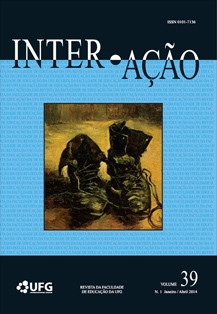EDUCATING MUSICALLY IN DIFFERENCE: THE CHALLENGES THE ARTS PLACE UPON EDUCATION
DOI:
https://doi.org/10.5216/ia.v39i1.29514Keywords:
Arts. Music education. Complex ecology. Education reform. Policy.Abstract
The aim of this article is to create a link between critical attributes to meaningful educational change and the kind of learning and thinking that is facilitated by artistic endeavors. The goal is not to simply advocate for the Arts, but rather to present a doorway to an educational practice that can be used in educational thought in general. The article starts from David McCarthy’s (2000) proposition that “we must think possibility within constraint; that is the condition of our time” (150), arguing that the kinds of thought experiences that individuals ‘doing art’ participate in, can serve as a model for educational thinking, particularly given the complexity, volatility and speed realities of a 21st century education.
Downloads
Downloads
Published
How to Cite
Issue
Section
License
Inter-Ação uses the Creative Commons Attribution 4.0 License for Open Access Journals (Open Archives Initiative - OAI) as the basis for the transfer of rights. Open access means making documents available on the Internet free of charge, so that users can read, download, copy, distribute, print, search, or link to the full text of documents, process them for indexing, use them as input data for software programs, or use them for any other lawful purpose, without financial, legal, or technical barriers.
Authors publishing in this journal agree to the following conditions:
1) Authors retain copyright and grant the journal the right of first publication, with the work simultaneously licensed under the Creative Commons Attribution License, which permits redistribution of the work with attribution and first publication in this journal.
2) Authors are permitted to enter into additional, separate agreements for non-exclusive distribution of the version of the work published in this journal (e.g., for publication in an institutional repository or as a book chapter), with attribution and first publication in this journal.
3) Authors are permitted and encouraged to publish and distribute their work online (e.g. in institutional repositories or on their home page) at any time before or during the editorial process, as this may generate productive changes as well as increase the impact and citation of the published work.















